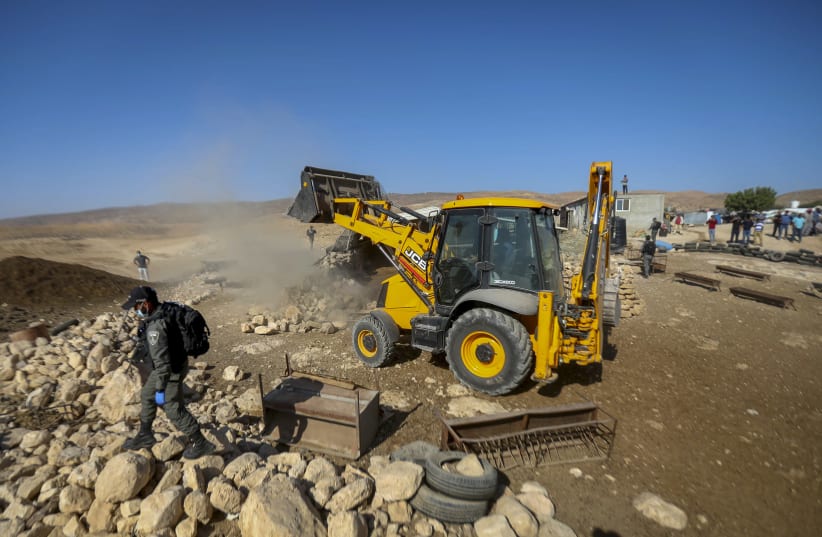The illegal West Bank herding village of Khan al-Ahmar was given a brief reprieve Sunday when the High Court of Justice gave the state until July 15, 2021 to explain its failure to evacuate the compound where some 180 Jahalin Bedouin live.
Regavim, the right-wing NGO which had petitioned the High Court hoping to compel the state to immediately evacuate the village of huts and tents, condemned the delay.
It took particular issue with the High Court’s decision earlier in the day to permit a closed door side-bar discussion with the state prosecutor. Attorneys for neither Regavim nor the bedouin of Khan al-Ahmar were privy to the conversation on which the ruling to allow for a seven-month delay was then based.
“It is easy for Netanyahu to hide behind a secret closed-door discussion, so as not to confront the public and explain why he does not implement the commitments he has made time and time again in public,” Regavim angrily retorted.
It pointed to the state evacuation of the illegal Jewish settler outpost of Amona and homes in the Netiv Ha-avot outpost and asked why Netanyahu could take action against Jewish homes, but not against Palestinian ones.
Netanyahu had promised to demolish Khan al-Ahmar in 2018, but then held back. In response to a Regavim petition, Netanyahu had asked for a four-month delay to present his argument to the court and was given a seven-month one.
But despite Regavim’s reaction, the ruling leans in its favor, because while the court delayed action, it did not dismiss the Regavim petition outright.
Khan al-Ahmar attorney Tawfiq Jabareen had predicted that the court would stand with the state.
“Still the problem of Kahn al-Ahmar is that the Israeli government wants to demolish it,” he said.
Perched on the outskirts of the Kfar Adumim settlement, the village has lived with the threat of demolition since Regavim petitioned against it in 2009.
During the court debate the state prosecutor Hadas Eran told the court that “there has been no change in the position of the upper echelon” with respect to the intention to demolish the herding village. Eran noted, however, that in its past ruling the court allowed the state to determine when the evacuation of its residents would be undertaken and set no date for its destruction.
Justice Noam Sohlberg clarified that the state was referencing the 2018 decision. He noted that in past debates going all the way back to 2009, the state had spoken of the urgency of evacuating the site.
At issue in particular, Sohlberg said, was the danger to the residents because the compound was located off of a major artery, Highway 1.
At every stage the state said its intention was to evacuate the compound, Sohlberg said. He asked Eran, if the state still held that view.
Eran said that the state still held that the best alternative for the compound was to relocate it to a new neighborhood of the town of Abu Dis in Area C, known as Jahalin West. But the timing for such a move is not yet, he told the court.
Jabareen asked the court to note the discrepancy between the state’s treatment of illegal settler homes, thousands of which were allowed to remain standing, while the state continued to pursue Khan al-Ahmar.
“There are thousands of demolition orders” against settler homes that have never been executed, Jabareen said. Where is the timetable to take down the outposts and the illegal homes in the settlements, he asked?
Israel expelled the Jahalin Bedouin from the Negev and into the neighboring West Bank when it was under Jordanian rule in the early 1950s. After the territory passed into Israel’s hands in 1967, the Abu-Dahuk clan of Jahalin settled in the area of Khan al-Ahmar during the 1970s.
The state has rejected attempts by the village in recent years to apply for permits and has offered two alternative locations, one in Jahalin West, near a landfill, and another near a sewage treatment plant. The residents of Khan al-Ahmar want to remain in their current location, but would agree to move further back from the road.
